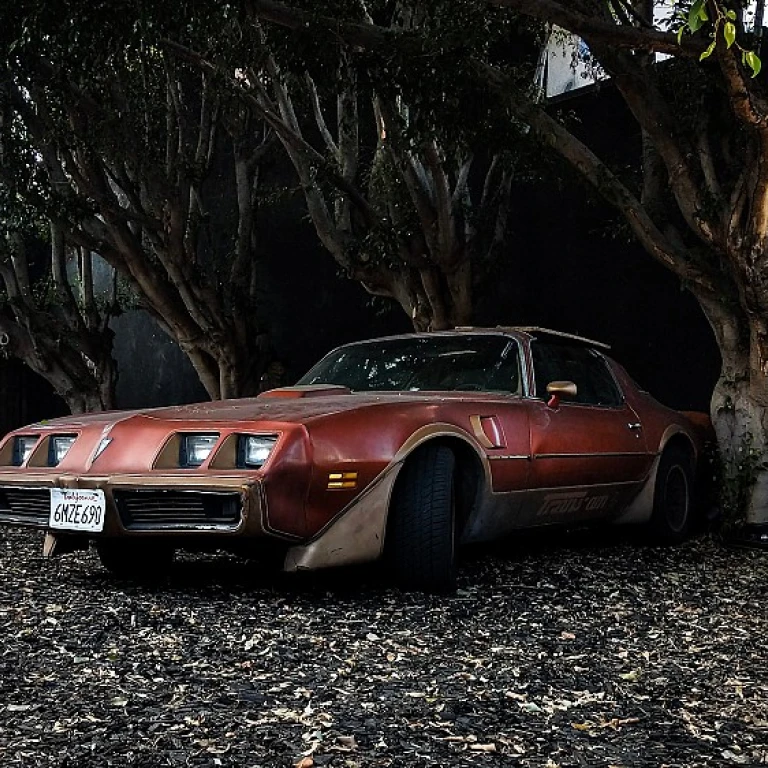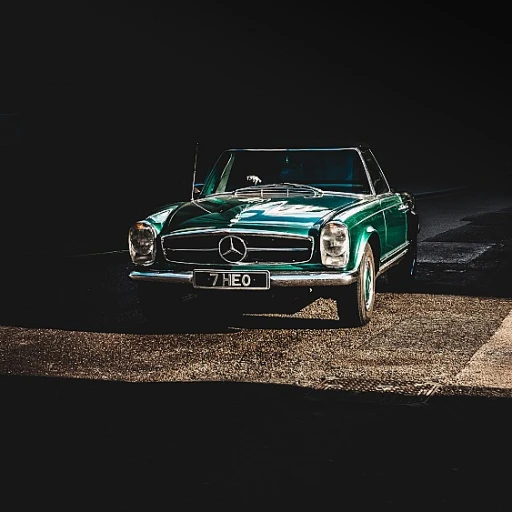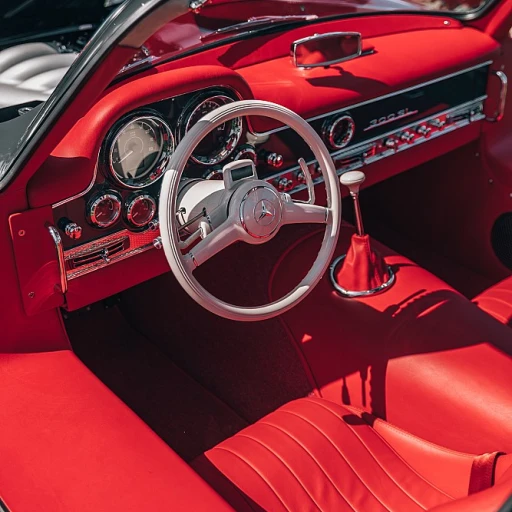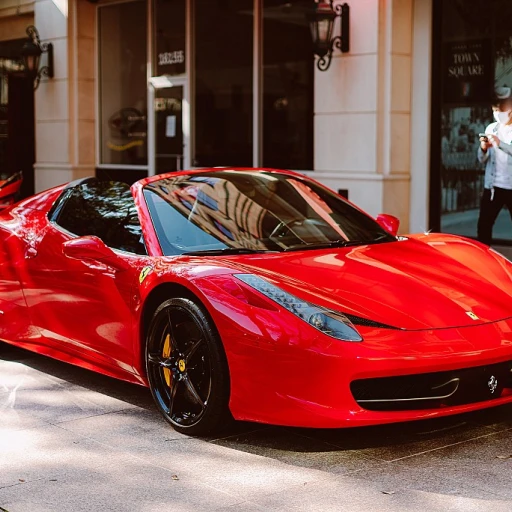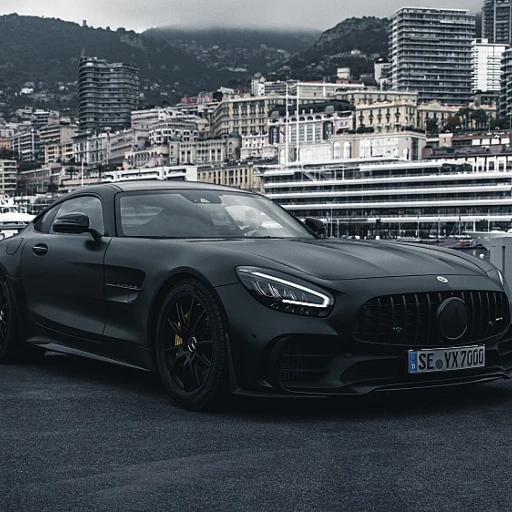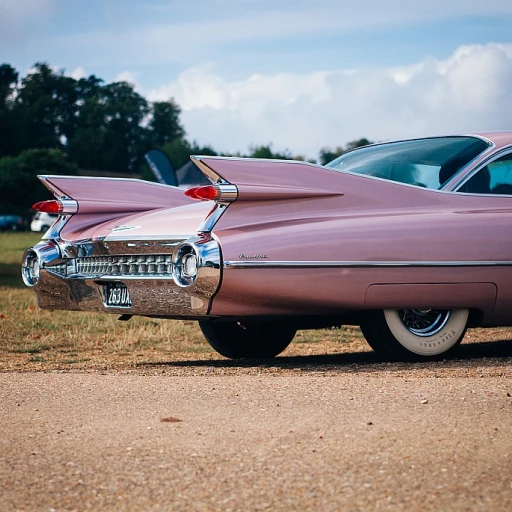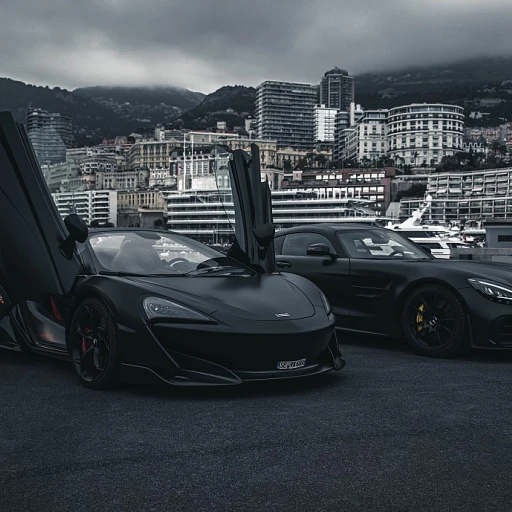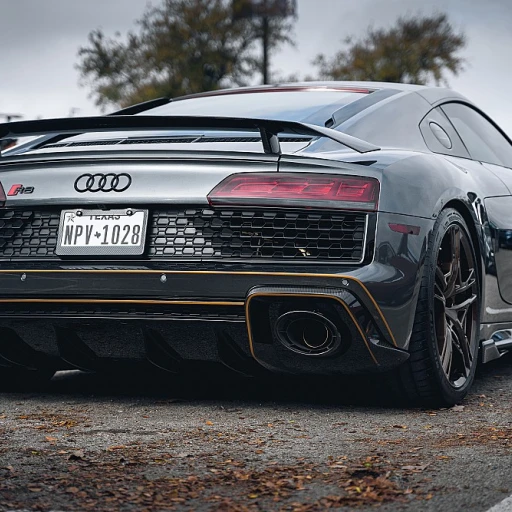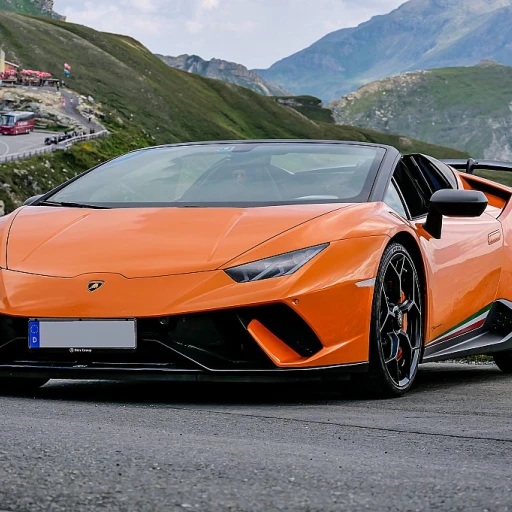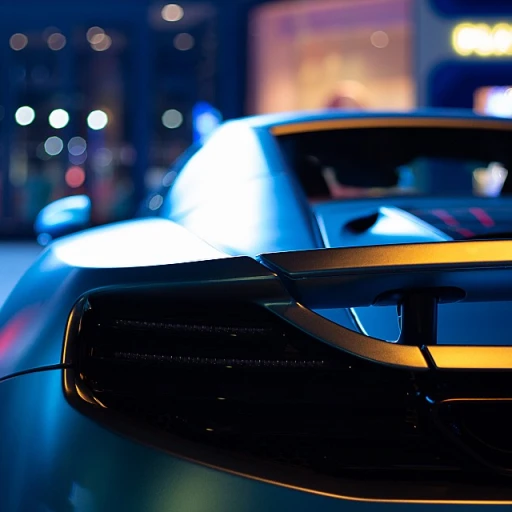The rise of luxury electric vehicles
Luxury electric vehicles: a growing trend
The world has seen a remarkable shift towards sustainable and luxurious mobility, paving the way for an impressive rise of luxury electric vehicles (EVs). These vehicles are not only green but they also cater to the needs of affluent buyers looking for performance, prestige, and eco-friendliness.
The transition from traditional combustion engines to electric drive trains isn’t just a trend; it marks a significant change in the automotive industry. For example, California, a pioneer in clean transportation, has been pivotal in promoting electric vehicles. In fact, the state has set an ambitious goal of banning the sale of new gasoline-powered cars by 2035 (source: California Governor's Office).
Adoption and market penetration
According to a study by BloombergNEF, electric vehicles are expected to represent 58% of global passenger car sales by 2040. The luxury segment is no exception. Brands like Mercedes-Benz, BMW, Audi, and Tesla are spearheading this shift. The future of high-end vehicles seems irrevocably tied to electric propulsion.
Leading models such as the Mercedes Benz EQS and the Tesla Model S have set benchmarks for performance and luxury, offering an extensive range and cutting-edge technology. The EQS, for instance, boasts a range of over 400 miles on a single charge, powered by a 108 kWh battery (source: Mercedes-Benz USA).
Demographics and shifting preferences
Luxury car buyers are becoming increasingly environmentally conscious. A recent report by Deloitte showed that 70% of luxury vehicle owners are considering an EV for their next purchase, driven by concerns over climate change and a desire for the latest in auto technology.
Automakers are responding to this shift by offering vehicles that don't compromise on style or performance. The Porsche Taycan is a prime example, combining Porsche’s legendary performance with electric efficiency. It offers rapid acceleration, superior handling, and a range of up to 227 miles (source: Porsche).
Regulations and incentives
Government policies, especially in regions like Europe and the U.S., are fostering the electric vehicle market. Incentives like tax breaks and subsidies are making it easier for consumers to choose electric. For instance, the U.S. federal tax credit offers up to $7,500 for eligible EV purchases (source: U.S. Department of Energy).
Top luxury EV models dominating the market
Mercedes-Benz EQS: defining luxury and technology
The Mercedes-Benz EQS sedan is setting a new standard in luxury electric vehicles. As of 2022, it has earned accolades for its interior opulence and cutting-edge technology. The EQS starts around $102,000 and can reach over $130,000 with various customizations. Equipped with a 107.8 kWh battery, it offers an impressive range of up to 350 miles on a single charge (source: Cars.com).
In terms of performance, the EQS showcases the strength of electric drivetrain with a dual-motor, all-wheel drive setup producing 516 hp. Mercedes-Benz's Drive Pilot system is among the most advanced autonomous driving systems on the market today, offering up to Level 3 self-driving capabilities (source: AutoExpress).
BMW iX: the electric SUV with a punch
The BMW iX, with a starting price of around $83,200, has been launched as a formidable electric SUV (source: Car and Driver). It brings efficient performance to the SUV segment with a range of up to 324 miles. Its dual-motor setup produces up to 516 hp, offering both rear-wheel drive and all-wheel drive options. Its advanced regenerative braking system, dubbed 'Pedal Drive Mode', is designed to maximize efficiency while providing a responsive and controlled driving experience.
BMW's iX is packed with intelligent technology, featuring a stunning curved display and an upgraded version of their iDrive interface. The iX also supports over-the-air updates, ensuring that the vehicle remains up-to-date with the latest software without the need for dealer visits.
Tesla Model S: the pioneer of high-tech elegance
The Tesla Model S remains a dominant force in the market for luxury electric cars. Priced from $94,990, the Model S offers a long-range edition with up to 405 miles per charge, which is especially appealing to U.S. customers looking for long-distance comfort. Tesla’s Autopilot system, with its advanced self-driving capabilities, places the Model S at the forefront of autonomous driving technology (source: Tesla).
Performance-wise, the Plaid edition of the Model S has received massive attention for its unmatched acceleration, achieving 0-60 mph in just under 2 seconds, making it one of, if not the fastest production cars on the market today (source: Car and Driver).
Porsche Taycan: the epitome of sporty luxury
The Porsche Taycan is a thrilling luxury EV known for merging performance with elegance. Starting at around $82,700, the Taycan provides a range of up to 227 miles. Despite the lower range compared to other models, its focus is on delivering a superior driving experience (source: Porsche).
This electric vehicle from Porsche offers jaw-dropping acceleration with the Turbo S model churning out 751 hp, achieving 0-60 mph in 2.6 seconds. It's not just about speed; with advanced handling and a low center of gravity, the Taycan takes corners effortlessly, living up to Porsche's legacy in every way.
For more detailed insights on performance and how luxury automakers like Mercedes-Benz, Audi, and BMW are utilizing electric drivetrains in their high-end vehicles, check out our full review here.
Innovations in luxury EV technology
Cutting-edge battery technology
Battery technology is taking giant leaps in the luxury EV market. Take the 2023 Mercedes-Benz EQS 450+, for example. This model boasts a substantial range of up to 487 miles on a single charge, thanks to its 107.8 kWh battery pack (source: Carscoops). The advanced lithium-ion battery technology is designed for both longevity and performance.
In-car AI advancements
Artificial Intelligence (AI) is now a headline feature for luxury EVs, significantly enhancing the driver's experience. Think of the Tesla Model S, which uses its Autopilot system to offer semi-autonomous driving capabilities (source: Tesla). By 2022, BMW introduced AI in its iX model, equipped with a personal assistant that adjusts settings based on user habits (source: BMW).
The era of connected vehicles
Connectivity is no longer just a perk; it’s become a standard. Modern luxury EVs like the Audi e-tron offer seamless connectivity that allows drivers to integrate their smartphones, smart home systems, and even access real-time traffic updates. According to a Statista report, by 2021, 77 million connected vehicles had been sold globally, indicating the massive scale of this innovation.
High-speed charging networks
The development of high-speed charging networks is pivotal for the rapid adoption of luxury electric vehicles. Porsche’s Taycan models support 270 kW charging, allowing a 60-mile range boost in just 5 minutes. Similarly, Tesla’s Supercharger network, which now features over 30,000 fast-charging points globally, has set significant benchmarks in the industry (source: Tesla).
Performance and range: what to expect
Performance and range: what to expect
The luxury electric vehicle market is dominated by heavy hitters like Tesla, Mercedes-Benz, and BMW, each competing to provide an optimal blend of performance and range that leaves few desires unexplored. One significant piece of data worth noting is that in 2022, the global average range of luxury EVs was around 310 miles, a figure that's steadily increasing as technology improves (source: International Energy Agency).
Taking center stage is the Mercedes-Benz EQS. With its sleek design and boastful stats, it extends a union of luxury and efficiency. The EQS offers an impressive range of up to 453 miles on a single charge, according to the European WLTP standard. This electric car isn't just about distance; it features rear-wheel drive and an all-wheel drive variant, providing a mix of versatility and power (source: Mercedes-Benz official website).
For those seeking thrill-imbued sophistication, the Porsche Taycan serves as an exhilarating choice. A particularly enticing model, the Taycan Turbo S, delivers a staggering 750 horsepower in overboost mode, taking you from 0 to 60 miles per hour in just about 2.6 seconds. Despite this sports-car-like performance, it maintains a credible 238-mile range per charge (source: Porsche official press release). As a testament to its engineering prowess, multiple reviews and performance tests have praised the Taycan's ability to balance luxury with high performance (source: Car and Driver).
The BMW iX, another player in this field, seeks to offer a premium electric experience. This model comes with a maximum range of 300 miles and features all-wheel drive, ensuring a robust and reliable drive, suitable for various driving conditions. The model has been warmly received by critics, who highlight its cozy, spacious interior, and next-gen tech integrations, including advanced driver assistance systems (source: BMW official press release).
Not to be missed in this roster is the champion of the electric vehicle market, the Tesla Model S Long Range Plus. It strongly asserts its dominance with an EPA-rated range of 405 miles. Tesla remains at the forefront when it comes to innovation and efficiency, and their constant over-the-air updates keep the vehicle's software fresh and continually enhancing the driving experience (source: Tesla official website).
Despite the enticing data, the electric vehicle range can see significant variance based on factors like driving style, weather conditions, and use of air conditioning or heating. For example, colder climates can reduce the battery efficiency by up to 20%, a disputed point among users in regions with severe winters (source: AAA study on EV range)
In essence, the performance and range of luxury EVs are continuously evolving, with new models pushing the boundaries of what we once thought possible and setting new standards for both innovation and opulence. Each of these models offers something unique, tailored to meet the desires of those who refuse to compromise on either luxury or performance.
Luxury EVs and sustainability
Sustainability initiatives in luxury electric vehicles
The automotive industry has been at the front of environmental advocacy with luxury electric vehicles (EVs) pushing the agenda harder. Companies like Mercedes-Benz and BMW have been taking bold steps towards embedding sustainability in every step of their production process.
With over 60% of luxury car manufacturers actively promoting sustainability initiatives, the shift towards using renewable materials and recycling programs is hugely noticeable. A good example is BMW's iVision Circular concept car that is committed to showcasing a fully recyclable vehicle made primarily from recycled materials.
Materials and manufacturing processes
Not all luxury EVs are made straight from metal and plastic. They rely more on sustainable materials such as recycled metals, sustainable rubber, and vegan leather. Experts like Dr. Christoph Kienzl from the Technical University of Munich have cited that the future of car manufacturing will revolve heavily around sourcing reusable materials, decreasing the carbon footprint significantly.
The high-end brands are employing innovative manufacturing processes. Tesla, for instance, uses 93% less water in their painting operations compared to traditional methods. On top of this, they also focus on energy-saving techniques by integrating solar energy within their Gigafactories.
EV range and carbon footprint
Another confrontational issue is the carbon footprint associated with EV production. While the production phase can have a high environmental impact, the operational lifecycle of EVs is much cleaner. According to a 2023 study by the International Council on Clean Transportation (ICCT), electric cars produce up to 50-70% less greenhouse gases compared to their gasoline counterparts throughout their lifetime.
Real-life examples and insights
A practical look at luxury EV sustainability is Portland-based entrepreneur Jane Mitchell's experience with her Mercedes-Benz EQS. She switched from an S-Class to the EQS and noted a significant reduction in her driving emissions, citing that despite a higher investment, the "better-for-the-planet feeling" is rewarding.
Dr. Leif Asp from Chalmers University of Technology is taking things further with research into structural batteries which can cut down electric vehicle weight, subsequently improving not just sustainability but also efficiency and performance.
Challenges and future roadmap
One ongoing challenge is securing a steady supply of ethically sourced materials like cobalt. It's been a hotbed of controversies, particularly surrounding the conditions of cobalt mines in the DRC. Auto giants are partnering with agencies to enforce stringent supply chain monitoring and transparency.
Looking forward, the trend is to integrate more green technologies into luxury EVs. Innovations like the Porsche Taycan's 800-volt system and the cutting-edge regenerative braking systems by Audi are milestones showing how operational efficiency and environmental responsibility can blend.
The role of design in luxury EVs
Masterpieces from the ground up
The design of luxury electric vehicles isn't just about aesthetics; it's about creating an experience. Brands like Mercedes-Benz and Tesla invest heavily in design innovation to ensure that their vehicles are not just stunning to look at but also superior in functionality. Luxury electric cars combine the elegance of high-end design with cutting-edge technology features. For example, many models from Mercedes' EQ line, such as the EQS and EQE, come with massive, interactive infotainment systems seamlessly integrated into sleek, high-tech interiors.
- Figures and data: In a 2022 Statista report, it was found that luxury EV sales are set to increase by over 335% by 2030. This growth is driven not just by the green revolution but also by the push toward more sophisticated designs.
- Case examples: Rolls-Royce Spectre, expected to hit the market in 2023, brings the Rolls-Royce signature design style to electric vehicle technology. Apart from the ultimate luxury finishes, it boasts customizable options for buyers. Another example is the Porsche Taycan, blending Porsche's classic sporty design elements with the demands for modern electric car functionality.
- Expert insights: Renowned car design expert, Frank Stephenson, who has previously worked with Ferrari and Maserati, said in a 2022 CNBC feature: "Electric vehicles give designers more freedom to experiment with shapes and materials that were not as feasible with internal combustion engines."
Eco-friendly yet luxurious
Luxury doesn't have to compromise on sustainability. Electric luxury vehicles emphasize eco-friendly materials without losing the opulence characteristic of high-end cars. Brands like BMW and Volvo are doing phenomenal work in this area. BMW, in its iX model, uses recycled materials extensively while maintaining a high standard of luxury and comfort. Volvo’s XC40 Recharge offers the epitome of Scandinavian elegance with a commitment to sustainable materials.
- Figures and data: According to a 2023 report by the International Energy Agency (IEA), 25% of the materials used in manufacturing the newest models of luxury EVs come from recycled sources.
- Expert insights: Klaus Frohlich, Senior Vice President of BMW Group, mentioned during an interview with the Motor Authority: "Sustainability doesn't just mean lower emissions; it extends to responsible material consumption and long-term resource management."
Challenges and controversies in the luxury EV market
Controversies surrounding luxury EVs
When it comes to luxury electric vehicles, not everything is smooth sailing. Despite their growing popularity, a series of controversies have emerged, some of which are giving potential buyers pause.Costly to own and maintain
It's no secret that luxury EVs come with hefty price tags. Averaging around $70,000 to $120,000, these cars are unquestionably a status symbol. But, as Forbes points out, the cost doesn't end at the purchase. Maintenance and repair costs can be sky-high, often due to the specialized technology and parts required. This is particularly true for brands like Tesla and BMW iX, where any repair or service can turn into a pricey ordeal. According to Consumer Reports, the annual repair and maintenance cost of a luxury EV can be around $1,200 to $1,400, compared to $800 for a gas-powered luxury vehicle.Battery degradation and range anxiety
There is also the ever-present issue of battery life. While manufacturers claim their batteries can last over 300,000 miles, real-world conditions often result in battery degradation much sooner. The degradation can lead to 'range anxiety,' a term coined to describe the fear that EV batteries will run out of charge before reaching a destination. A J.D. Power survey found that 65% of potential EV buyers identify range anxiety as a significant barrier to purchase. Despite advancements, like the Mercedes-Benz EQS boasting a range of about 350 miles, this concern persists.Environmental impact of battery production
Environmental concerns also come into play. Luxury EVs are often marketed as the eco-friendly alternative to traditional gas guzzlers, but the environmental impact of producing high-capacity lithium-ion batteries is significant. The International Energy Agency (IEA) reported that battery production accounts for approximately 45% of the total emissions over an EV's lifecycle. Mining activities for lithium, cobalt, and nickel often lead to environmental degradation, raising questions about the real ecological benefits of EVs.Electric grid and charging infrastructure
Then there’s the issue of charging infrastructure. Although Tesla has made strides with its Supercharger network, many regions still lack the robust infrastructure needed to support a burgeoning luxury EV market. According to the International Council on Clean Transportation, only 17% of necessary public charging points have been installed globally. This shortfall can lead to significant inconvenience for luxury EV owners, undermining the seamless experience these vehicles aim to provide.Software and electronic issues
Luxury EVs, often packed with high-tech features and autonomous driving capabilities, are not immune to software bugs and electronic issues. Tesla, in particular, has faced multiple recalls due to software glitches affecting its Autopilot system. This has led to criticisms regarding the safety and reliability of such technologies, a sentiment echoed in a Consumer Reports study where 50% of luxury EV owners reported issues with their vehicle's software.The future
Despite these challenges, the sector is forging ahead, investing heavily in addressing these concerns. With continuous innovation and investment, it's anticipated that many of these issues will be mitigated over time. As Mercedes-Benz, Audi, and BMW ramp up their efforts, and newer players like Genesis Electrified and Rolls-Royce Spectre join the fray, the future of luxury EVs looks promising. Navigating through these controversies, manufacturers and consumers alike must weigh the pros and cons carefully. While these hurdles are notable, the strides being made suggest a bright and luxurious electric future is still on the horizon.Future trends in luxury electric vehicles
Technological advancements and their impact
Electric vehicle (EV) technology keeps charging ahead, especially in the luxury segment. As we look forward, we see a trend where automation and artificial intelligence play central roles. Experts like Dr. Sebastian Thrun, known for his work with Google's self-driving car project, suggest that within a decade, fully autonomous luxury EVs will likely become a reality.
Sustainability and eco-focus
Luxury electric vehicles are redefining sustainability. Porsche has set the bar high with its Taycan model, which uses vegan leather interiors and environmentally responsible manufacturing processes. According to a report on eco-luxury innovations, brands like Mercedes-Benz are achieving impressive sustainability credentials, aligning with the broader push towards carbon neutrality by 2030.
Expanding model ranges and customization
Brands are expanding their range to cater to various tastes. For instance, Mercedes-Benz offers everything from the posh EQS to the more accessible EQE sedan. BMW is following suit with multiple electric SUVs, such as the iX and i4. These models give consumers the luxury of choice along with the benefit of zero emissions.
Global market dynamics
Europe leads the luxury EV march, especially in countries like Norway where EVs make up over 54% of new car sales. The U.S., particularly California, is not far behind. China is also rapidly becoming a critical player, thanks to government incentives and growing consumer interest. According to a study by McKinsey & Company, up to 30% of the global luxury car market could be electric by 2030.
Consumer trust and brand loyalty
Building trust is vital, especially in the luxury sector. People trust brands like Tesla and Mercedes-Benz, not just because of their history but due to their continued innovation in electrification. A Deloitte survey showed that 64% of premium car buyers are willing to pay more for an EV if it comes from a trusted brand.
Emerging players and partnerships
New entrants like Rivian and Lucid Motors are becoming significant competitors. Even legacy manufacturers are partnering to stay ahead. For instance, the BMW and Jaguar Land Rover collaboration aims to develop next-gen electric drive units to enhance performance and efficiency, pushing luxury EVs further into the mainstream.

